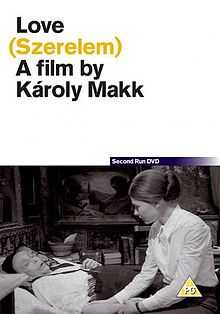Love (1971 film)
| Love | |
|---|---|
 | |
| Directed by | Károly Makk |
| Written by |
Péter Bacsó Tibor Déry (novel) |
| Starring |
Lili Darvas Mari Törőcsik |
| Cinematography | János Tóth |
| Editing by | György Sívó |
| Distributed by | Ajay Film Company (USA) |
| Release dates |
|
| Running time | 84 minutes |
| Country | Hungary |
| Language | Hungarian |
Love (Hungarian: Szerelem) is a 1971 Hungarian drama film directed by Károly Makk. Based on two short stories by Tibor Déry, Szerelem (1956) and Két asszony (1962), it stars Lili Darvas and Mari Törőcsik. It won three prizes, including the Jury Prize at the 1971 Cannes Film Festival.[1] The film was also selected as the Hungarian entry for the Best Foreign Language Film at the 44th Academy Awards, but was not accepted as a nominee.[2]
Cast
- Lili Darvas - Az öregasszony
- Mari Törőcsik - Luca
- Iván Darvas - János
- Erzsi Orsolya - Irén
- László Mensáros - Az orvos
- Tibor Bitskey - Feri (as Bitskei Tibor)
- András Ambrus - Börtönőr
- József Almási - Tanár
- Zoltán Bán - Borbély
- Éva Bányai - Feriék szolgálója
- Ágnes Dávid - Feriék szolgálója
- Mária Garamszegi - Feriék szolgálója
- Alíz Halda - Tanárnő
- Magda Horváth - Kissné
- Nóra Káldi - Az öregasszony fiatalon (as Káldy Nóra)
Historical background
Károly Makk tells the story of a young Hungarian woman whose husband has been arrested by the secret police and who eases the last months of his mother with the tale that her son is in America. In 1953 after the death of Soviet premier Joseph Stalin many arrested people were released in Hungary. The film "Love" won the Jury Prize at the 1971 Cannes Film Festival and is one of Derek Malcolm / The Guardian's Top 100 Films of the 20th Century.
See also
- List of submissions to the 44th Academy Awards for Best Foreign Language Film
- List of Hungarian submissions for the Academy Award for Best Foreign Language Film
References
- ↑ "Festival de Cannes: Love". festival-cannes.com. Retrieved 2009-04-12.
- ↑ Margaret Herrick Library, Academy of Motion Picture Arts and Sciences
External links
- Love at the Internet Movie Database
- Love at allmovie
| Awards | ||
|---|---|---|
| Preceded by Magasiskola tied with The Strawberry Statement |
Jury Prize, Cannes 1971 tied with Joe Hill |
Succeeded by Slaughterhouse-Five |